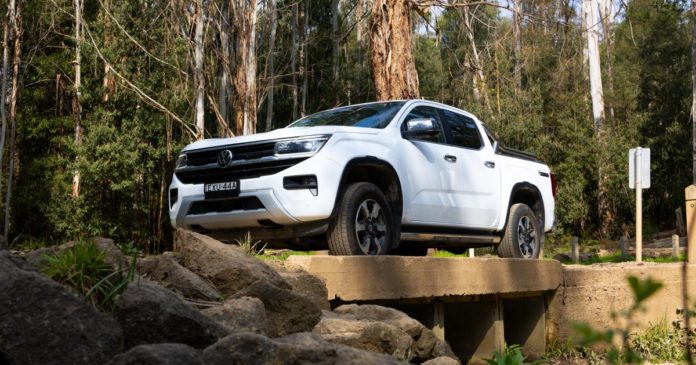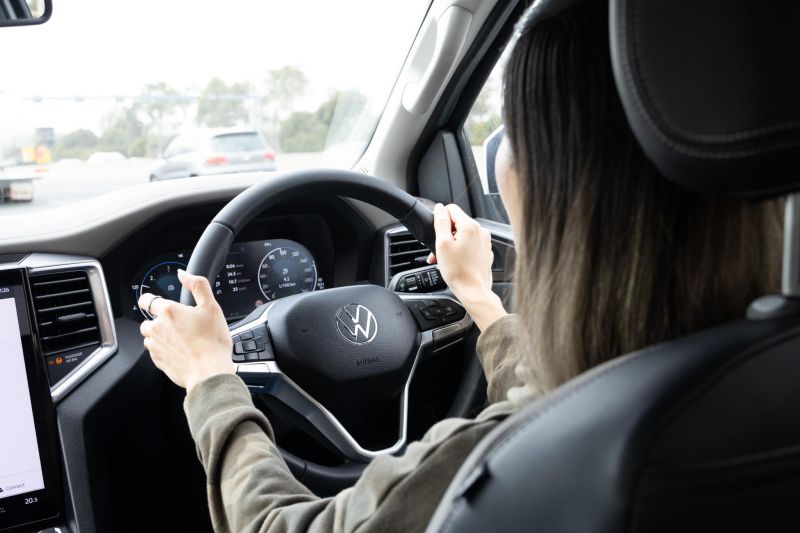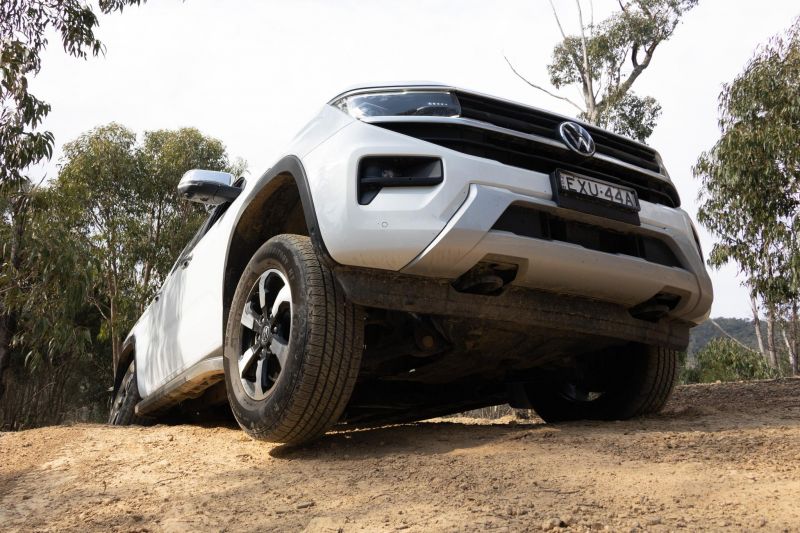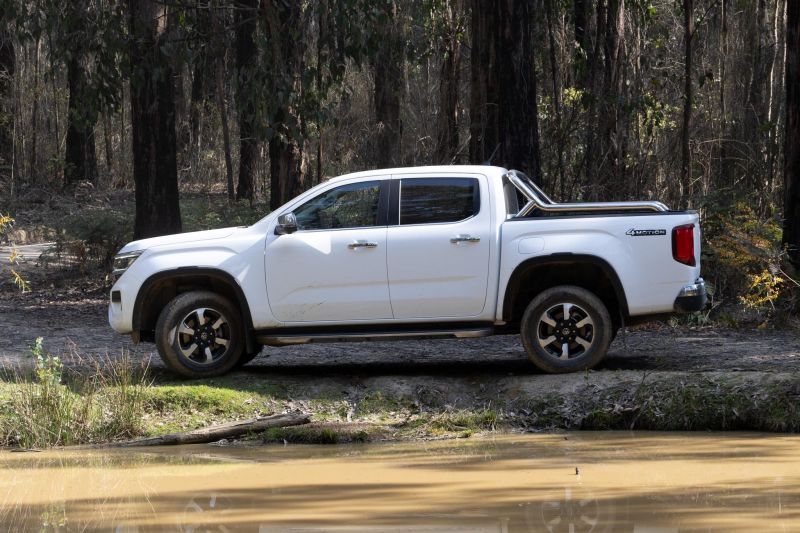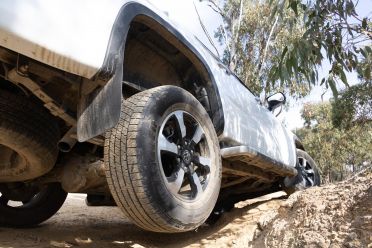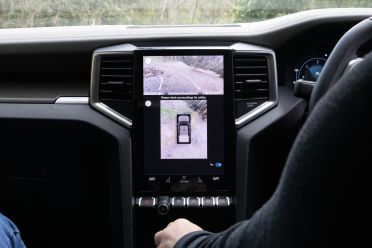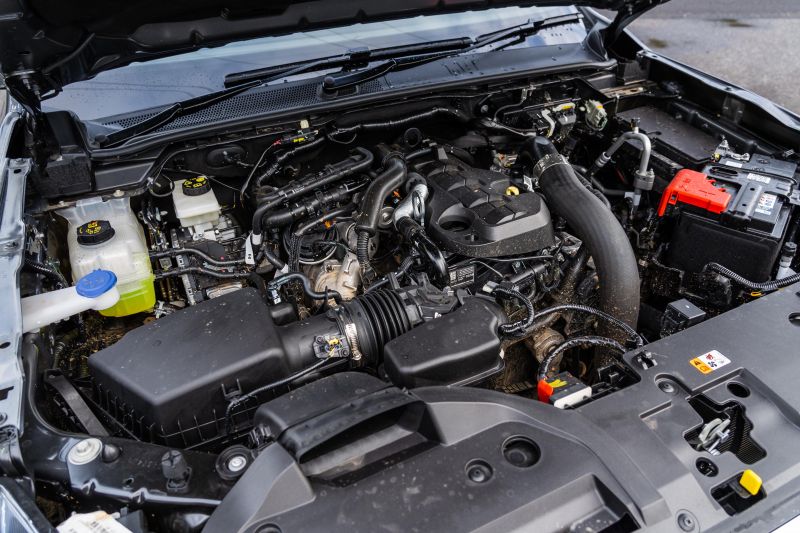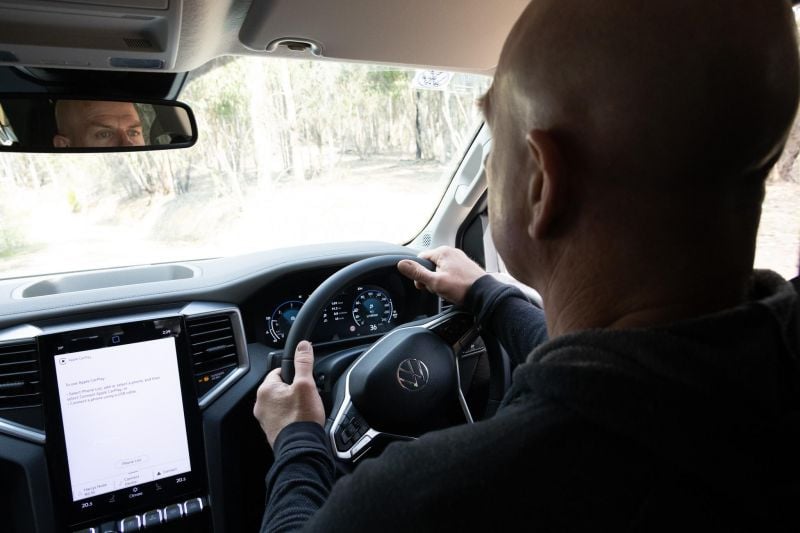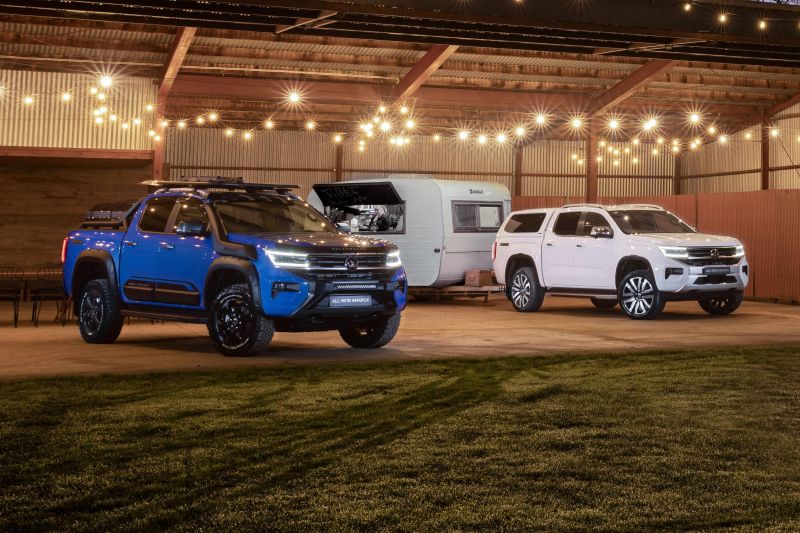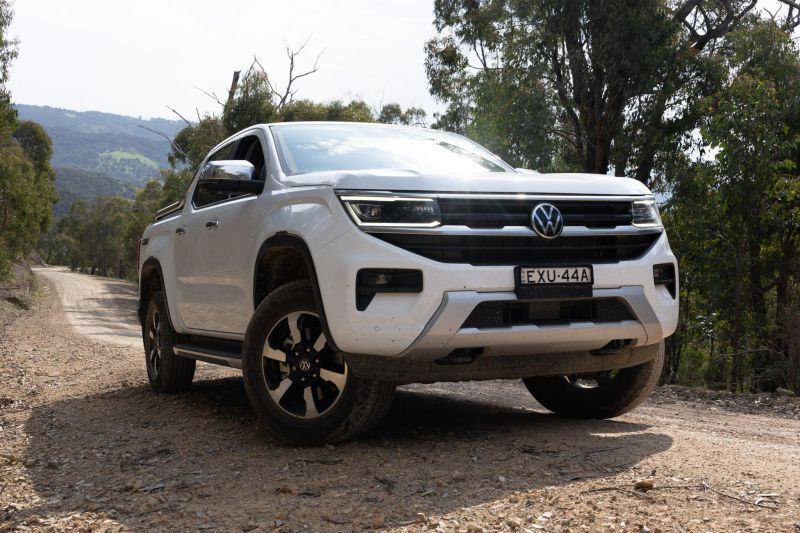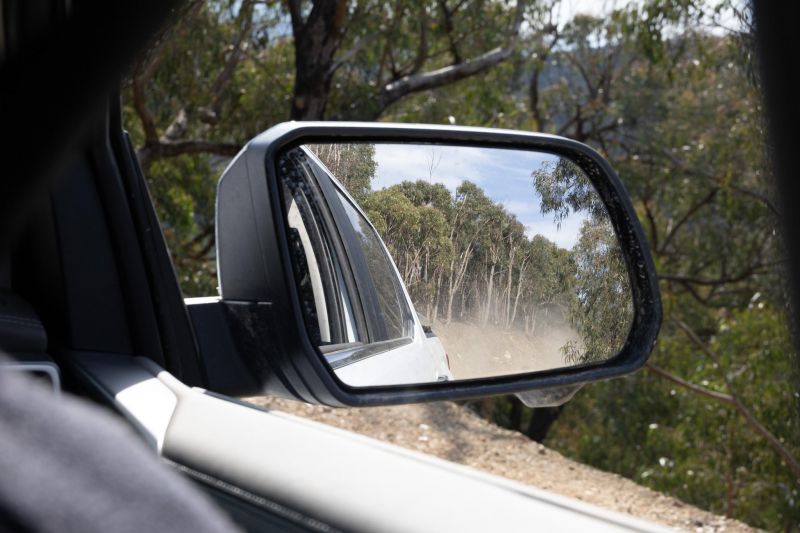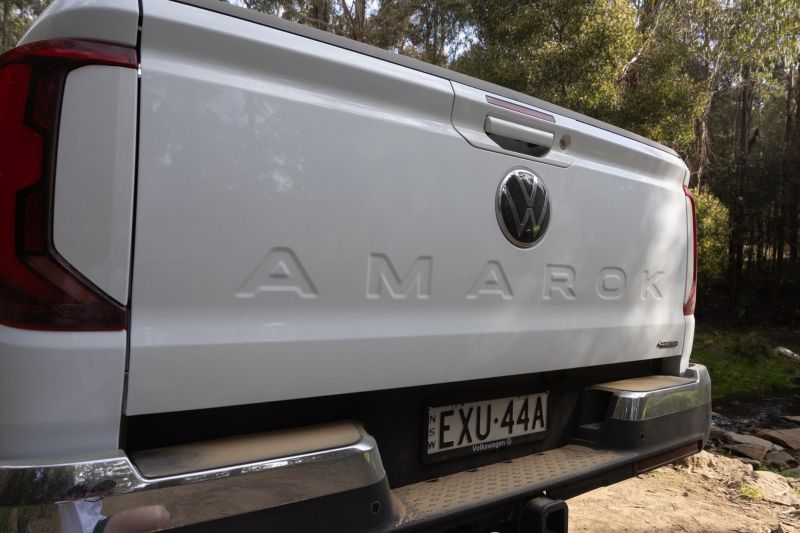The Volkswagen Amarok is a well-known mid-tier dual cab 4×4 that retains enough market share to compete, yet never climbs to the sales heights and reputation of sector leaders such as Toyota HiLux and Ford Ranger.
Does it deserve to find more buyers? In an effort to find out more and make a valid evaluation of the current Amarok, I am heading off-road north out of Melbourne and into one of my favourite forests to put an Amarok Style TDI500 to the test.
When approaching the Amarok, its stance and overall looks are unassuming – and that is being generous. It lacks ‘muscularity’, bold styling, and falls well short of my idea of outdoor ruggedness.
Hitting the bitumen and heading out of town, the two most striking things are the clumsy indicator stalks and the engine exhaust noise.
The stalks seem to be an over complicated design that are cumbersome and unintuitive, whilst the exhaust system makes the engine sound far too much like an old two-stroke lawn mower – the theme of being unimpressive is now becoming well entrenched but there is still more to come!
The interior is also not my favourite. The faux wood looks fake (funnily enough), the door handles (like the Ford Ranger) are awkward, and the dashboard has a large recess that, whilst practical, just seems to be a great place for dust to gather.
The air vents and other appointments are dated and look like they belong on the set of Battlestar Galactica. I found many of the switches and dials unattractive, although they are practical. It’s not a great start for the Amarok, but let’s check out how it drives.
The idle stop-start fuel saver is quite slow to respond. There are momentary feelings of ‘something is wrong’ or being embarrassed by the lack of motion after the traffic lights have turned green – just before the vehicle actually re-starts and gets going.
At least the vehicle is well insulated, as cabin noise levels are low and the heated seats are extremely comfortable; however, the rear suspension is overly stiff. Overall, the hushed cabin and quality seats make it a surprisingly pleasant space to spend time.
Off-road
This is where things look up for the Amarok. The 4WD selector is basic (in a positive way), easy to find and easy to operate unlike the Ranger’s, which is complicated and has a dual-purpose 4WD selector combined with an off-road mode switch.
As we hit the dirt, the stiff rear end reacts in a far more positive manner, and unlike may others in its class the Amarok soaks up the bumps, corrugations and potholes without the typical skipping sensation many utes suffer.
At speed on dirt, the ugly duckling is transformed into a confident, road-hugging and comfortable rocket.
It glides over the terrain, steers well through corners and offers a very positive sense of feedback and control through both the steering and suspension. It’s German engineering excellence (if we can still call it that).
At slower speeds, low-range is quick and simple to engage, the ratios are good and the addition of the rear diff lock brings the Amarok squarely into line with any 4x4s in the same category in terms of off-road performance.
Of course the independent front suspension and stiff rear offer minimal articulation, and when faced with anything literally bigger than a gutter you can expect to be lifting wheels.
We deliberately pushed the Amarok past its limits and were impressed by its stability, tractability and control, even in circumstances where it had a wheel well into the air.
In these situations, a diff lock is a must have traction aid and the performance and safety it provides is a real winner.
We found the Amarok to be a fun workhorse off-road. In both 4H and 4L it was comfortable, capable and full of confidence.
On paper it presents as no better a 4×4 than any other dual-cab on the market; but the tweaks to the suspension, steering, braking and operating systems are welcomed.
Similar for the interior layout and controls that are basic but extremely practical and functional. The Amarok’s engineering is nothing new or innovative, yet its simplicity provides for a far improved driving experience off-road, and that alone is a big plus.
What’s under the bonnet?
We are often told that only milk comes in two litres, but the Amarok’s 2.0L bi-turbo diesel is quite pleasant to drive on and off-road and actually outputs more torque and power than the Mazda BT50’s 3.0L turbo diesel.
Teamed with the Amarok’s tight rear end, as mentioned above, it is quite a bit of fun to drive on dirt. It is certainly more fun than many of the other’s in its class.
Backed by a 10-speed auto, it’s the same powertrain and transmission as in the Ford Ranger, yet unlike the earlier Raptors that consistently searched for the right gear, this latest iteration doesn’t seem to hunt as much.
Traditionally, small-capacity motors and big power demands, let alone big towing jobs, are recipes for disaster.
However modern tech, smart engineering and good old automotive know-how have made for quite an efficient, reliable and capable engine that can pleasantly kick along the highway, climb the steepest tracks and tow with confidence.
Whilst the drivetrain starts out as identical to that of the Ford Ranger, the Amarok leaves it for dead when it comes to steering fundamentals, chassis dynamics, suspension set ups and overall handling.
The Amarok may be an ugly duckling but it is definitely nicer to drive than most other dual-cabs.
Mod-ability
In the area of accessories, the Amarok is an absolute winner.
It’s not that there are more accessories and upgrades available, it’s more so a case of how much the Amarok’s appearance can be changed (read clearly as improved) with the addition of some high-quality aftermarket gear.
Add a Tough Dog suspension kit underneath for a bit more clearance, an ARB bullbar (with their latest LandCruiser 300-inspired look) for frontal protection and a set of Mickey Thompson tyres for added traction off road.
Then your run-of-the-mill Amarok will be transformed into a tough-looking off-road warrior with improved handling, performance and safety.
Many underestimate the importance of after-market products, even from the perspective of how their simple availability can influence and drive new car sales.
There is a reason why companies like ARB have stayed ahead of the game, and for the most part have led the automotive off-road style guides, with their functional and fashionable designs.
CarExpert’s Take on the Volkswagen Amarok Style TDI500
While the Amarok lacks the style, personality, pizzazz or X-factor of its rivals; beyond the ‘plain Jane’ exterior, the Amarok is a solid performer that makes for a pleasant and comfortable drive, especially when off-road.
The engine and driveline are solid but it’s the chassis and the rest of the vehicle that makes better use of that shared driveline, resulting in a far more stable and overall better driving experience. Whilst it doesn’t have the muscular looks of others, it does have the power and platform to deliver the goods.
Current automotive trends see too many vehicles looking alike (like the Ford Bronco and GWM Tank 300); designers either pushing for more ‘American’ looks (HiLux and Ranger); or vastly different styles like the Mitsubishi Triton and Land Rover Defender.
At least in the case of the Amarok, you can always opt for aftermarket accessories that will vastly improve its appearance.
Considering perceptions and appearance, it did eventually win me over and there is definitely a market for it. Whilst the exterior and interior design is a let-down (for me, at least), the mechanical engineering team have excelled here.
Its looks may be too hard to overcome for some, but I think there will be a growing number of customers out there who are interested in a more subtle-looking ride that can drive or tow with aplomb.
Take a second look at the Amarok, or more appropriately take a test drive: you won’t be disappointed.
Click the images for the full gallery
BUY: Volkswagen Amarok
MORE: Everything Volkswagen Amarok

